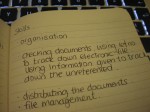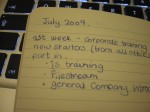Everyone has a different style of keeping a career log, or something for a similar purpose. Other people have no such system. As a recent graduate, I feel that a Career Log is an essential tool to assist with job hunting and getting some direction. That said, a career log is focused on your current and previous jobs rather than your career aspirations but they do help you channel your focus later.
Many friends who keep a career log of sorts tend to do it in one notebook. I use one notebook per job (or if you are further along in your career path you could probably do one per employer).
So why keep a Career log?
A Career log keeps a record of your job and job related activities that after a period of time you may forget, but it can be useful whatever your situation. It can:
- help you when you are looking for a job when you are deciding what type of role you would like.
- can help with job applications and interviews by highlighting your skills, what you like and what your job is.
- can help with internal reviews / appraisals in your current job or if you are applying for a promotion / pay rise.
- helps you assess your own career progression and reassess long term goals – are you doing what you want to be doing?
Tempted? Well here is what I do:
1. The Introduction
The beginning of the notebook is all about the basics. It is a good idea to write down your actual job title and job description as written on your contract and what you earn. (It is also important to update this as it changes). Also note down the address and a contact number / reference as this is frequently asked for on CVs/Application forms.
2. My Daily Job
I then write a piece on what my day job actually entails. The number of times I’ve been asked that in an interview is shocking. So it is also a good idea to note down your average day to day activities.If you have a repetitive schedule it can be good to do this as a timeline.
3. The Diary
I do this monthly because I’ve a very repetitive job at the moment, but if you do a lot of things all the time it would be advisable to keep a more regular record. Here I note what I have done during the past month. This is mainly an achievement section in addition to “my daily job”. For example getting more responsibility, or one -of tasks that you were given that impressed your boss. It can really be as simple as someone else was off sick and you handled the cover. It is also interesting to look back and see how your role has developed.
4. Loves and Gripes
I also note this along with the diary section on a sort of timeline. It is good to remind yourself what you love about your job, this helps you out when you are feeling blue, or from another angle helps build up your passion for a role that will shine through in your appraisal or application for promotion. It is equally important to note your gripes. Be it with improvements that your employer needs to make, or things that make you think, I need a career change. And in a more negative manner, building up a record in preparation of a complaint. But probably more importantly of all, how can you improve the job you are in?
5. Skills
Responsibilities are covered by your diary, but it is also important to realise what skills come out of your job. So I have a separate section for skills. This is important if you are applying for a new job or a promotion. There are several ways to do this, but as a graduate on the look out for a job I have quite a specific way of doing this. I list the skills I think my day to day job shows, and make a few bullet points about evidence (they always ask for examples in interview, make sure you’ve got one). The other thing I find key is every time I apply for a new job, whether I actually get an interview or not, I look at what they are looking for – the skills and add it to my list. either in a bit to improve that skills or as one that I do have evidence of, but didn’t include. There are many you can forget or might have overlooked. For example, a recent job asked for case management system experience – I do a lot of that in my current job, but never really thought about it as a skill and it made me think – other employer’s might like that. So this is a great thing to build up. It is also important to update, when better or different examples of the skills come along so this section if you prefer can be tied into the diary section.
6. Targets
Although this book isn’t about your career aspirations frequently employers get you to agree targets with them for the year be they personal or company targets, or tell you about aspects of your job they need to see an improvement in. This section is for that. Of course if you don’t have specific ones handed down from on high, you can have your own personal goals included in here and track your progress, some people prefer that if they don’t have a dedicated progress journal.
Now you know what to put into it, so how do we use it?
A career log can be a useful tool, use it as you go along in your job, update monthly (or more frequently if it suits) and then when, if you are a job-seeker, are making applications, when preparing for interview etc. Also back date and keep one for previous jobs as well. I personally use my progress journal to compare and contrast the different jobs, and interlink, but some people may find it easier you combine, particularly the range of odd jobs we tend to have these days as students. It only has to be in note form, but these notes can go a long way in helping you develop something great for other things.
So simple:
Make notes on the above topics, review monthly or when doing job applications and use in conjunction with your progress journal if you have one.




5 thoughts on “How To: Keep a Career Log”